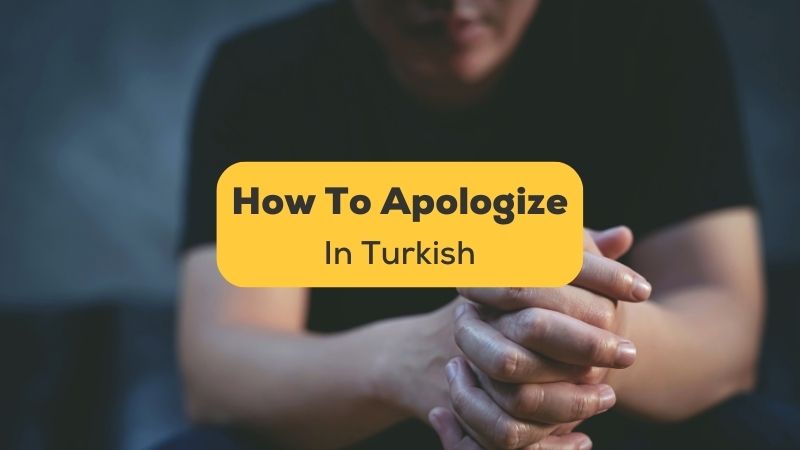Did you do something wrong and want to make it up? Learn how to apologize in Turkish!
Have you ever needed to apologize in a foreign language that you’re not fluent in? It can be a tough situation for you because there are many phrases to say sorry in Turkish but you have to find the right one for your situation.
I think speaking Turkish gives you more freedom compared to English when you’re talking about your feelings. Not surprisingly, there are more ways to say sorry in Turkish than there are in English.
If you’re ready, let’s learn how to apologize in Turkish! (I hope you won’t need it though!)
Page Contents:
- Why Should You Learn To Say Sorry In Turkish?
- How To Apologize In Turkish?
- 1. Özür dilerim
- 2. Üzgünüm
- 3. Öyle demek istemedim
- 4. Kusura bakma
- 5. Lütfen beni affet
- Other Phrases To Say Sorry
- Learn Turkish With Ling App!
Why Should You Learn To Say Sorry In Turkish?
Learning a new language is all about socializing with other people and cultures. No one is perfect and sometimes we may hurt people unintentionally. However, you must realize your mistake later and apologize sincerely. Then I’m sure you’ll be forgiven.
If you don’t apologize at all, it could damage your perception in the eyes of the other person. Not to mention it is very rude. So, when it comes to Turkish, you should also know how to apologize. It’s an important value in Turkish culture.
How To Apologize In Turkish?

There are five common ways to apologize in Turkish and they differ in the context they’re used. For example, one phrase is used for minor mistakes while the other phrase is used in a more serious situation.
1. Özür dilerim – I apologize
This is the most commonly used phrase to apologize. You can use this phrase when you’ve done something wrong but then realize you shouldn’t have done that. After saying “özür dilerim” you’re expected not to repeat your mistake again.
It is a common and neutral phrase, Turkish people say it for both small and serious things. So, it’s up to the context.
Examples:
- Kalemini kaybettiğim için özür dilerim. (I apologize for losing your pencil.)
- Özür dilerim, seni incitmek istemedim. (I apologize, I didn’t mean to hurt you.)
2. Üzgünüm – I’m sorry
This word literally translates as “I’m sorry” in English. Though English speakers use this phrase to apologize for something, Turkish speakers use this phrase to express that they’re feeling sad or upset. So it’s not really the best choice to apologize for something serious.
Examples:
- Geciktiğim için üzgünüm. (I’m sorry for being late.)
- Üzgünüm, dün seni arayamadım. (I’m sorry, I couldn’t call you yesterday.)
3. Öyle demek istemedim – I didn’t mean that
You can use this phrase when you accidentally say something offensive and want to take it back. But I don’t think it is convincing enough because what is done is done, right?
Examples:
- Bence daha az yemelisin. (I think you should eat less.)
- Sen bana şişman mı diyorsun? (Are you calling me fat?)
- Hayır tabi ki, öyle demek istemedim. (Of course not, I didn’t mean that.)
4. Kusura bakma – Sorry/Pardon me
You can say “kusura bakma” for small mistakes such as bumping into someone on the street or being late to a friend’s meeting. There is no corresponding phrase for it in English but I think it would be a mix of the meanings of sorry and pardon me.
It is an informal and casual phrase so be careful where and to whom you say it!
Examples:
5. Lütfen beni affet – Please forgive me
Well, you must have done something really really bad to apologize with this phrase. Because it has a meaning like you’re begging to be forgiven. It is an intense phrase so don’t use it for small mistakes.
Examples:
- Beni aldattığını biliyorum. (I know you’ve cheated on me.)
- Lütfen beni affet! Tekrar yapmayacağım. (Please forgive me! I won’t do it again.)
Other Turkish Phrases To Say Sorry
Here is the list of other Turkish words and phrases you can use:
- afedersiniz – excuse me
- affetmek – to forgive
- telafi etmek – to make up for something
- pardon – excuse me
- benim hatam – my bad
- benim suçum – it’s my fault
- o bir hataydı – it was a mistake
- tekrar yapmayacağım – I won’t do it again
- seni kırmak istememiştim – I didn’t mean to hurt you
- kalp kırıklığı – heartbreak
- kalbimi kırdın – you broke my heart
- benim yüzümden oldu – it happened because of me
Do you want to learn more than just apologies in Turkish? Then check out the Ling App right now!
Learn Turkish With Ling App!
If you want to learn the Turkish language or other foreign languages, waste no more time and check out the Ling App to start learning something new today!

Ling is a language learning app designed to help all language learners passionate about learning a new language. Ling App consists of various interactive exercises, such as writing and listening exercises, mini quizzes, and an AI chatbot to practice your speaking skills. The Ling App offers you everything to enhance the four primary language skills.
Also, remember to go to Ling’s Turkish blog for weekly new articles about learning Turkish and its culture!
So, what are you waiting for? Try Ling for FREE by downloading it from the App Store or Play Store!
Until next time! Görüşürüz!


































































